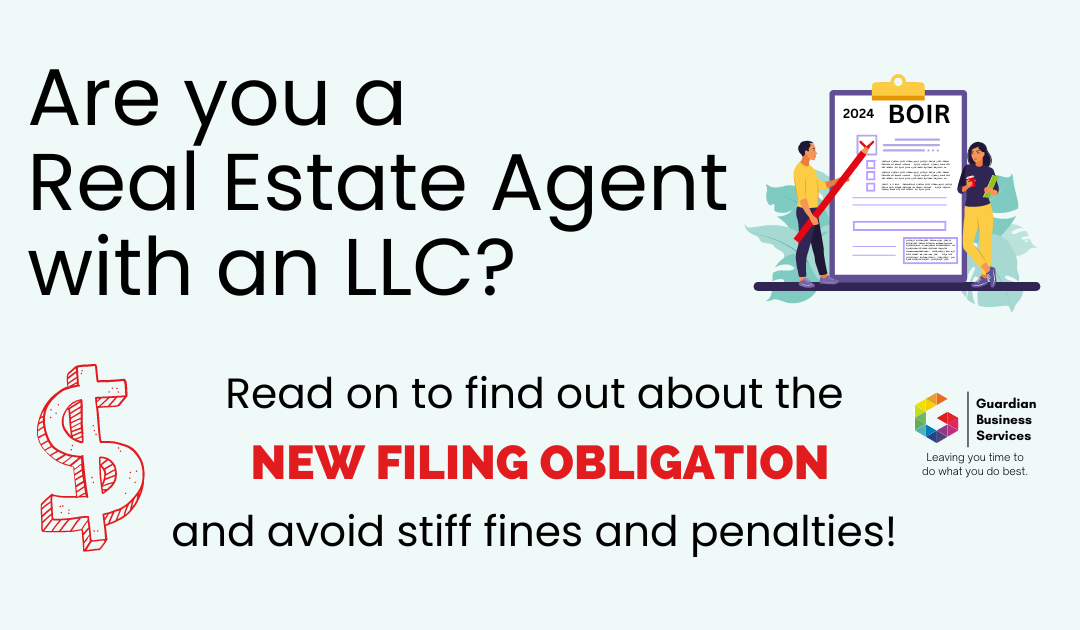Is your real estate business currently operating under a limited liability company (LLC)? If so, are you aware of the annual Beneficial Ownership Information (BOI) report? This added filing obligation applies to all agents with LLCs, regardless of whether you are a single-member LLC filing on Schedule C or an S Corporation.
Noncompliance with new BOI reporting requirements carries stiff fines and penalties, reaching as high as $500 PER DAY. This makes it important to understand your filing obligations and the important deadlines you need to abide by.
In this article, we’ll cover everything you need to know about BOI reporting, including the rationale for this new requirement, important due dates, and potential penalties for noncompliance.

What is the Beneficial Ownership Information Report?
The Beneficial Ownership Information Report looks to gather information about owners of companies, both domestic and foreign. This report is mandated by the Financial Crimes Enforcement Network (FinCEN) who is looking for fraud, corruption, and money laundering conducted through companies formed in the United States. By identifying the owners of companies that have fraudulent activities, the FinCEN can easily bring charges forward.
The Corporate Transparency Act (CTA) put this filing requirement into place, with 2024 being the first year FinCEN is accepting and reviewing reports. The provisions in the CTA require all eligible businesses, regardless of size, to submit information about individuals who directly or indirectly control the company.
What Companies are Subject to BOI Reporting?
FinCEN BOI reporting requirements apply to most companies, including LLCs, LLPs, and any other company that is created by forming registration documents with a secretary of state. The FinCEN classifies companies into two categories: domestic and foreign. A domestic company is one that is created within the United States, while a foreign company is created outside of the United States but registered within the United States.
For example, most realtors will be considered domestic companies since they live and operate the business within the United States. On the contrary, an individual who lives abroad and forms a company in the United States would be considered a foreign reporting company.
There are a few different classes of companies that are exempt from BOI reporting requirements. Among this list are banks, credit unions, investment companies, public utility companies, inactive entities, and accounting firms. For a complete list of exempt companies, visit FinCEN’s website.
Understanding the BOI Reporting Requirements
Eligible businesses will need to gather owner information and submit the report to FinCEN by the end of the year. (Check out their BOI Small Entity Compliance Guide for more detailed information.) Here’s the information you will need to have on hand:
1. Reporting Company Information
This section of the BOI report will identify your company. Have the following information readily available:
- Full Legal Business Name – This is the name you filed your organization documents using.
- Trade Name – This is the name you go by.
- U.S. Address – This is the business address on file with the IRS and state agencies.
- State of Formation – This is the state you formed your business in, which will usually be the state you are practicing real estate.
- Identification Number – If you are a single-member LLC, you might use your Social Security Number. However, if you have an Employer Identification Number, use this.
- State of First Registration – This only applies to foreign reporting companies that changed their registration state.
2. Beneficial Owners
The next section of information will give details about company owners. According to BOI guidelines, individuals who own or control more than 25% of the company need to be listed. FinCEN defines ownership as capital or profit interests, stock, contracts, voting rights, or equity in the company.
Since profit interests are considered ownership, upper management might have applicable ownership if they have direct ties to the success of the company. In addition, individuals that can appoint or remove officers need to be reported even if there is no direct link to ownership.
For real estate professionals, the specifications of ownership interests won’t be applicable. These provisions apply to large enterprises. Once you’ve identified the individuals that need to be reported, you will submit the following information for each person:
- Full Legal Name
- Date of Birth
- Current Address
- Identifying Number (Passport, Driver’s License, or FinCEN Identifier)
- Image of the Identifying Number Document
Minor children, employees, and creditors do not need to be reported even if they meet the ownership requirements outlined by FinCEN.
3. Company Applicant
The last section of the BOI report asks for information about the individual filling out the report. The same information given for beneficial owners is required for the company applicant, including full legal name, date of birth, current address, and identifying number.
It’s important to understand that filing the BOI report is free. However, if you use a third-party service to manage your filings, they will charge a fee. The information found on the BOI report is relatively straightforward, meaning you can handle this filing on your own. Otherwise, consult with your attorney for a filing service recommendation.
When is the BOI Report Due?
The FinCEN BOI reporting requirements went into effect on January 1, 2024. Companies formed prior to 2024 will have until January 1, 2025 to file the initial BOI report. If your company was formed in 2024, you will have 90 days from the company formation date to submit your report. The new business filing deadline is reduced to 30 days starting on January 1, 2025. Additionally, each time you change owners, you will need to update your BOI filing within 30 days.
Penalties for BOI Report Noncompliance
The penalties for noncompliance can be severe, with fines of $500 per day up to $10,000 and two years in prison for failure to file. If you submit a BOI report without authorization from owners, you can also face fines of $500 per day up to $250,000 and five years in prison.

Summary
The new Beneficial Ownership Information reporting guidelines need to be understood to avoid fines and penalties. Most real estate agents operating in the United States will be subject to this filing, unless you operate as a sole proprietorship. To begin filing your report, click this LINK. For more information on what your business needs to do to prepare, contact a qualified accountant or attorney.

